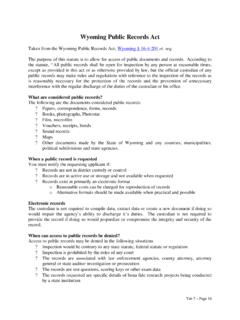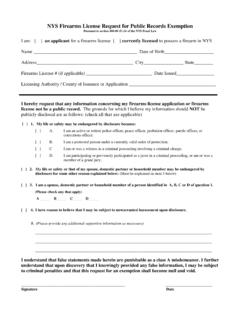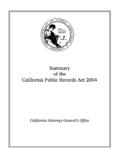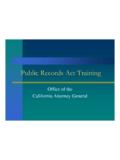Transcription of A QUICK REFERENCE GUIDE TO OREGON’S PUBLIC RECORDS …
1 A QUICK REFERENCE GUIDETO oregon S PUBLIC RECORDS LAWFor elected and appointed local and state publicofficials, members of oregon boards and commissions,citizens, and nonprofit groupsThe GUIDE is published as a PUBLIC service byOpen oregon : a Freedom of Information Coalitionin collaboration with the oregon Attorney General s the PUBLIC s right to know2 Every person has a right to inspect anypublic record of a PUBLIC body in this state,except as otherwise expressly OOrreeggoonn PPuubblliicc RReeccoorrddss LLaawwHow to Use this GuideThis publication is a QUICK step-by-step GUIDE to the OregonPublic RECORDS Law for those seeking information fromgovernment as well as for those keeping the RECORDS . It isdivided into 12 sections, and includes TIPS and EXAMPLES onaccessing PUBLIC RECORDS . SSEECCTTIIOONN PPAAGGEE1.
2 oregon s PUBLIC RECORDS Law .. 4 2. Policy .. 53. Who is Subject to the Law .. 54. How it Works .. 75. Seekers versus Keepers .. 76. Cite the Law .. 97. What is Exempt .. 108. PUBLIC Interest Versus Confidentiality .. 129. How RECORDS are Made Available .. 1410. Helpful Hints for Custodians .. 1411. Fees .. 1512. How to Appeal a Denial .. 16 The entire law may be found in oregon Revised Statutes to information may be obtained by sending an e-mail request or contacting Open oregon , PO Box 172, Portland, oregon 97207. For the Legislative Counsel text of the law as of the 2005legislative session, go to For a comprehensive analysis of the law, refer to the latest edition of theAAttttoorrnneeyy GGeenneerraall ss PPuubblliicc RReeccoorrddss aanndd MMeeeettiinnggss manual isreviewed and updated for consistency after each legislative session. Eachnew edition also incorporates appellate court decisions and Attorney Generalopinions interpreting the PUBLIC RECORDS law.
3 For information aboutpurchasing the manual, go to orcall 503-378-2992, ext. 325, or write to Department of Justice, 1162 Court , Salem, OR 97301-4096. 3 THE SPIRIT OF oregon S PUBLIC RECORDS LAWTT hhee ssttaattee ooff OOrreeggoonn hhaass aa ppoolliiccyy ooff TThhee mmoossttiimmppoorrttaanntt aaddvvooccaattee ffoorr ooppeenn ggoovveerrnnmmeenntt iiss tthhee ppuubblliicc nneewwss mmeeddiiaa oofftteenn aaccttss oonn tthhee ppuubblliicc ss bbeehhaallff iinn sseeeekkiinnggppuubblliicc rreeccoorrddss ttoo iinnffoorrmm cciittiizzeennss aabboouutt tthhee wwoorrkk ddoonnee iinn IInnddiivviidduuaall cciittiizzeennss aallssoo ppeerrffoorrmm tthhiiss wwaattcchhddoogg ffuunnccttiioonnuussiinngg tthhee ppuubblliicc rreeccoorrddss llaaww ttoo iinnffoorrmm tthheemmsseellvveess aabboouutt hhoowwwweellll tthhee ggoovveerrnnmmeenntt iiss Open RECORDS laws that are effective and well-understoodare a fundamental component of democracy.
4 oregon 's lawensures that PUBLIC agencies conduct affairs in a transparentand accountable manner and provide that citizens haveaccess to PUBLIC processes. HHaarrddyy MMyyeerrssOregon Attorney General Government can only serve the people when citizens havethe tools they need to witness it in action. PUBLIC RECORDS giveevery American those crucial tools. BBiillll BBrraaddbbuurryyOregon Secretary of StateHonorary Co-Chair, Open oregon PUBLIC access to PUBLIC RECORDS is an essential component foreffective governance in a democracy. The oregon PublicRecords Law enhances good government and serves theinterests of the people of oregon . DDaavvee FFrroohhnnmmaayyeerrPresident, University of OregonHonorary Co-Chair, Open OORREEGGOONN SS PPUUBBLLIICC RREECCOORRDDSS LLAAWWO regon s PUBLIC RECORDS law ORS to attempts to balance the need for efficient government withthe PUBLIC s need to know how government 1973, oregon joined many other states across the countryin enacting the PUBLIC RECORDS and PUBLIC Meetings Laws.
5 At the time the PUBLIC RECORDS law was passed, oregon s lawwas one of the most sweeping in the nation. In the decadessince, however, lawmakers have steadily added exemptionsallowing more information to be kept from the PUBLIC . Whilepersonal privacy was always protected by the law, recentheightened concerns about privacy, PUBLIC safety andhomeland security have caused agencies to further limitrelease of information. Ultimately, the law is intended to opengovernment activities, not citizens private lives, to the law makes an important distinction between electedofficials and PUBLIC bodies. The law applies to each similarlybut two differences are noteworthy: The law imposes a seven-day deadline for elected officials torespond to a RECORDS request. PUBLIC bodies do not have a specificdeadline; they simply must respond as soon as practicable andwithout unreasonable delay. The law provides for no administrative appeal of an electedofficial s denial; the requestor must file a lawsuit in court to pursuethe denied RECORDS .
6 Denials by non-elected PUBLIC -body officials maybe appealed to either the county district attorney or the stateattorney general, depending on whether the agency is a stateagency or a local agency; this appeal must precede the filing of :: DDoonn tt ccaallll iitt FFOOIIAAThe state PUBLIC RECORDS law is similar to the federal Freedom ofInformation Act in some ways, but they are separate laws withdifferent provisions. For information about seeking RECORDS from thefederal government, go to the Reporters Committee for Freedom ofthe Press: PPOOLLIICCYYOn its face, oregon s PUBLIC RECORDS law sounds simple. Itapplies to all government RECORDS and writings. The law favorsdisclosure as the rule, and agencies have the burden ofproving an exemption allows them to withhold information. In practice, though, the law is more complex. The attorneygeneral s office, 36 county district attorneys and oregon scourts all have a role in interpreting the application of the law.
7 WWHHOO IISS SSUUBBJJEECCTT TTOO TTHHEE LLAAWWThe law applies to any PUBLIC body, and it defines that termbroadly: every state officer, agency, department, division,bureau, board and commission; every county and citygoverning body, school district, special district, municipalcorporation, and any board, department, commission, councilor agency thereof; and any other PUBLIC agency of the , police and fire departments, county and stateagencies, cities: all are subject to the PUBLIC RECORDS PUBLIC RECORDS law does not apply to private entities suchas nonprofit corporations. Even some organizations thatsound PUBLIC or conduct some PUBLIC functions are not publicbodies. oregon PUBLIC Broadcasting and the oregon SchoolActivities Association, for example, are not PUBLIC bodies,according to the Attorney General s office. In 1994, however, the oregon Supreme Court ruled that thelaw applies to an entity that is judged the functionalequivalent of a PUBLIC body.
8 RRuulliinngg oonn pprriivvaattee bbooddiieess Was the entity created by government or independently? Is the entity s functions traditionally performed by government?6 Does it have authority to make binding decisions or only recommendations? How much financial and non-financial support does it receive from government? Does the government employ the entity s officers and employees? What is the scope of governmental control over the ffoorr sseeeekkeerrss ooff ppuubblliicc rreeccoorrddss:: Invest time in learning about the agency and the RECORDS it createsor maintains and routinely releases to the PUBLIC . If you are seekingfire department RECORDS , find out what reports are generated after ahouse fire or a hazardous materials incident. That helps you laterwhen you need to know what record to request. It helps the agencyto know the specific document title because that s the easiest andmost efficient process for the agency.
9 All PUBLIC bodies are required to follow state-approved schedulesdefining categories of RECORDS and how long they are to bemaintained. These RECORDS Retention Schedules act as an index togovernment RECORDS . Unless you specifically know the name of therecord you are seeking, first contact the agency s RecordsManagement program or officer. If the agency does not have aprogram, you may find additional information on the oregon StateArchives RECORDS Management website: Work the chain of command: Overworked PUBLIC employees maydeny release of a record that is indeed PUBLIC . They might beuncertain, wrong or just busy. Refer the request to a supervisor inthe agency who might be more knowledgeable or have moreauthority. Do this in a courteous and non-confrontational way. Ask whether the agency employs a PUBLIC affairs or publicinformation official. That person typically is well-versed in therequirements of the RECORDS law and often is the person whoresponds to RECORDS If the agency does not employ a PUBLIC information specialist, askthe PUBLIC employee to seek legal advice on the issue of releasingrecords.
10 Often a QUICK phone call to the county counsel or the localdistrict attorney clears up the HHOOWW IITT WWOORRKKSSR equests by regular citizens, reporters, attorneys orinvestigators can be made in person, by letter, e-mail orphone. Most agencies prefer that initial requests be madeinformally to discuss the specific needs of the seeker. Mediamembers, for example, often begin with a phone call and, ifrequested by the custodian, will follow up with a moredetailed written SSEEEEKKEERRSS KKEEEEPPEERRSSW hile most PUBLIC RECORDS are readily provided to thoserequesting them, contentiousness can arise between thoseseeking RECORDS and the custodians of PUBLIC body disclosure is the spirit of the law and most recordsare available for PUBLIC disclosure, regular seekers of recordsoften simply assume that the RECORDS they seek exist and areaccessible. Conflicts can occur when record keepers areunaccustomed to requests or don t realize that their onlyconcern should be whether the law exempts a record fromdisclosure.








